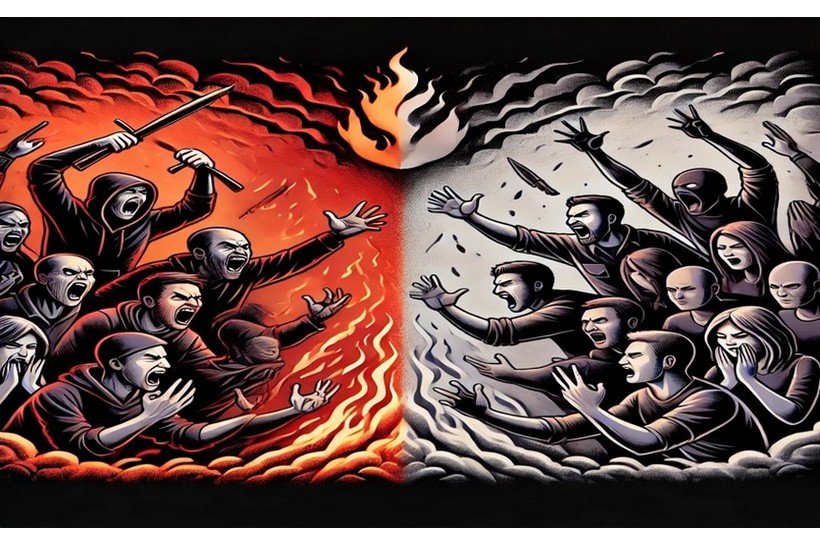History is repeating itself because this is also what the United States sought to do against Russia from 2019 onwards by following the roadmap laid out in advance by the Rand Corporation in “Extending Russia”.
The US did not want a direct confrontation with Russia, but it was delighted to have been able to put neo-Nazis in charge of Ukraine that would do the dirty work for it. (The Problem of Nazism in Ukraine) Everywhere, the United States is on the offensive with the aim of destroying all competition and preserving its primacy, which is increasingly challenged by the course of history. Acting as pyromaniacs playing with fire, it assumes that Russia and Iran will back down, even under the most serious threats. This demented policy is leading the world to catastrophe.
Avoiding the trap?
The solution for Russia was to engage militarily but in the form of a special military operation that it wanted to be short-lived, with specific objectives of denazification and demilitarization, in the hope of reaching a negotiated agreement as quickly as possible. It was this agreement, concluded as early as April 2022, that was quickly set aside by the North American and British protagonists, promoters of the escalation.
The behavior of the USA towards the Middle East is based on the same subterfuge. They say they are in favor of a ceasefire, but at the same time they pour oil on the fire by subsidizing and arming Israel so that it continues its genocide, just as they financed Ukraine in the hope of weakening Russia.
This version of events is not what is reported in the mainstream media, which considers it Russian propaganda. The unanimity on this subject is laughable and shows to what extent pervasive Russophobia is fanned by US propaganda. Alleging Russian propaganda whenever there is any criticism of the United States is part of the US propaganda arsenal.
Will doubt finally appear?
It would be fortunate if the public, observing US military support for the State of Israel, began to question the true role of the United States in Ukraine. Do repeated Israeli provocations against Iran echo those of the United States against Russia? Even if we disapprove of the internal political systems of Russia and Iran, these states have a right to security. They must not be provoked or forced to intervene militarily.
The USA use proxies to establish their domination: setting the Mujahideen against the USSR in Afghanistan; helping the Contras against the Sandinistas in Nicaragua; sponsoring the Kurds sometimes against Syria, sometimes against DAESH; helping Al Qaeda and DAESH against Bashar Al Assad in Syria. Now it is using Ukraine as cannon fodder to weaken Russia, and backing Israel to ultimately weaken Iran. As for China, the U.S. will need several proxies, which is why it is already actively preparing them: Taiwan, but also Japan, South Korea, the Philippines and Australia.
Biden said that the North Americans are the only ones who can rule the world. We now understand the horrors to which this US vision of the world can lead us, even if we confine ourselves to the Middle East. However, we should also begin to see the presence of a Machiavellianism insensitive to the Ukrainian people in the US policy aimed at weakening Russia. Fight Russia “to the last Ukrainian” (Lindsay Graham); fight Russia in Ukraine so you don’t have to fight Russia in the U.S. (Adam Schiff); fight Russia, what a boon, without any loss of North American human life! (Mitt Romney)
The US dollar: a hard currency
The similarity between the two situations is glaring. In both cases, the United States is using proxies. When it is not Ukraine, it is Israel. In both cases, the USA seek to isolate or destroy competitors to oil sold in petrodollars. The Russians and Iranians within BRICS+ are increasingly considering the possibility of selling their oil and gas in their respective national currencies, or in the currency of the buyer. The Saudis recently sold their oil to China priced in yuan.
For the USA, preserving the US dollar as the world’s reserve currency is absolutely crucial. With a debt of almost $35,000 billion and a trade deficit of a trillion dollars a year, they simply cannot afford to see the value of the US dollar decline. That’s why they fight so fiercely to maintain their hegemonic position in the world. If they maintain their hegemony in the world, the dollar will continue to dominate and remain the world’s reserve currency. People all over the world will continue to buy US Treasuries without central banks having to raise the key interest rate to attract capital. If, on the other hand, the BRICS+ gains momentum and the dollar loses value, interest rates will have to be raised to attract foreign capital, slowing economies, increasing inflation and adding to debt.
The North Americans feel they must neutralize or fight off competitors who seek to stand up to them and impose a multipolar world. They seek to impose their hegemony by force, as much by using Ukraine against Russia as by using Israel against Iran.
____________________________________________________
This post is also available in French
 Samir Saul holds a doctorate in history from the University of Paris and is a professor of history at the Université de Montréal. His latest book is L’Impérialisme, passé et présent. Un essai (2023). He is also the author of Intérêts économiques français et décolonisation de l’Afrique du Nord (1945-1962) (2016), and La France et l’Égypte de 1882 à 1914. Intérêts économiques et implications politiques (1997). He is also co-editor of Méditerranée, Moyen-Orient : deux siècles de relations internationales (2003). Email : samir.saul@umontreal.ca
Samir Saul holds a doctorate in history from the University of Paris and is a professor of history at the Université de Montréal. His latest book is L’Impérialisme, passé et présent. Un essai (2023). He is also the author of Intérêts économiques français et décolonisation de l’Afrique du Nord (1945-1962) (2016), and La France et l’Égypte de 1882 à 1914. Intérêts économiques et implications politiques (1997). He is also co-editor of Méditerranée, Moyen-Orient : deux siècles de relations internationales (2003). Email : samir.saul@umontreal.ca
Michel Seymour is a retired professor in the Department of Philosophy at the Université de Montréal, where he taught from 1990 to 2019. He is the author of a dozen monographs, including A Liberal Theory of Collective Rights, 2017; La nation pluraliste, co-authored with Jérôme Gosselin-Tapp, for which the authors won the Canadian Philosophical Association Prize; De la tolérance à la reconnaissance, 2008, for which he won the Jean-Charles Falardeau Prize of the Canadian Federation for the Humanities and Social Sciences. He also won the Richard Arès prize from Action nationale magazine for Le pari de la démesure, published in 2001. Email : seymour@videotron.ca web site: michelseymour.org
